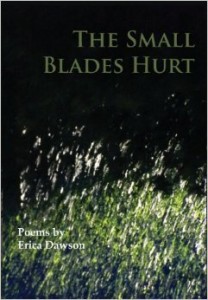
WINNER of the 2016 POETS’ PRIZE
WINNER OF THE 2014 FLORIDA BOOK AWARDS BRONZE MEDAL FOR POETRY
BUY THE BOOK www.amazon.com, www.barnesandnoble.com, www.powells.com
In The Small Blades Hurt, Erica Dawson picks up where her debut collection, Big-Eyed Afraid, leaves off: “The world’s outside. I’m in.” She moves from her border state Maryland to the true South, the Midwest, and back, delivering poems where a single memory can tangle with America’s collective past. Dawson finds a home in the tradition of formal poetry, carving a place all her own, whether manic and cozy in a poem with only one rhyme, or calm in a crown of sonnets’ claustrophobia. No matter the form, Dawson explores lust and love, past and present, accidents and the ache of plans gone wrong. Everything from Al Green to Abraham Lincoln is fair game. And even when the world seems to have steadied itself, The Small Blades Hurt reminds us that we may have the tendency to lead, but “someone must slip and feel it.”
Praise for The Small Blades Hurt:
Reading Erica Dawson’s poems reminds me of the time a former race car driver took me on a crazy tour along the southern French coast’s narrowest roads. It felt dangerous and exhilarating. I kept peering over the edge of the cliffs at the ocean far below, and I kept thinking, “Well, this will be a beautiful place to die.” But that driver, much like Erica Dawson, was always in control. I love her poems for that control, and for their music and humor and eccentricity. She is one of my favorites. – Sherman Alexie, author of Blasphemy: New and Collected Stories
We all agree: Erica Dawson possesses one of the finest sets of ears in contemporary poetry. She, too, sings America, and she sings it with a sound that is stridently authentic, uproarious, insightful, and full-heartedly human. If you’re not smitten by the last poem in this book, you should fly off to another planet. Earth is not for you. Her sound is in the soil. – Major Jackson, author of Holding Company
Erica Dawson is a poet of verve and nuance, of high learning and pop culture, of a classical music she seems to have invented herself. As in her first book, Big-Eyed Afraid, she doesn’t stay afraid for long. Here, in The Small Blades Hurt, are a brave tour de force tribute to Josephine Baker and a crown of sonnets that merges the imagery of love-gone-wrong and space travel. Funny even when she’s sad, Dawson can wring your heart with a poem to a son not yet conceived, or with the simplest question: ‘Who’s dew to say that morning needed tears?” I simply love her work. – Mary Jo Salter, author of Nothing by Design
Like E. E. Cummings’s burlesque top banana (“viz. ‘Would you hit a woman with a child?—No, I’d hit her with a brick’ ”), Erica Dawson is “abnormally fond of that precision which creates movement.” Her words never subside into shopworn sounds, each poem displaying her rare and enviable genius for making verse sing, which is to say croon, caterwaul, belt, syncopate, wail. In the tradition of Walt Whitman and Langston Hughes, she, too, sings America—and particularly the American South, from Texas and Oklahoma to Florida, Tennessee, and beyond. To Hughes’s twelve-bars, she adds Appalachian strings and Motown and to Whitman’s resplendent leaves the knowledge that sometimes it’s the smallest (newest, greenest) blades that sting us most. To steal a phrase, this book has mojo like a mofo! – David Yezzi, author of Birds of the Air
“Dawson draws an especially timely self-portrait. She generates great energy by pulling at the impossible and sometimes pleasurable tangles of what is constant in us, and what is disposable in the world.” – Slate
“The Small Blades Hurt is a chronicle of a still-young life being lived to the fullest.” – The Hudson Review
“These poems show a poet who lives as vividly as she writes, dancing with cowboys, drinking 40s, singing and loving, all while holding her country up to the light, scrutinizing its incongruities, critiquing its injustices, reveling in its pleasures… For their music, for their recklessness, for their restlessness, her poems are insane and insanely her own. There is no one writing like Erica Dawson.” – The Hopkins Review